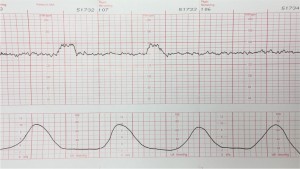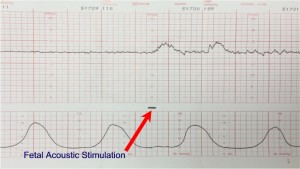Among the important types of deviations of the FHR tracing from the baseline is a fetal heart “acceleration.”
These usually occur in response to fetal movement, are 15 BPM above the baseline or more, and last at least 15 seconds (a 15 x 15 acceleration). At gestational ages less than 32 weeks, these accelerations are smaller and briefer, rising 10 BPM and lasting 10 seconds.

Accelerations can often be provoked by stimulating the fetal scalp during a pelvic examination, or by acoustically stimulating the fetus with a loud, obnoxious noise. The presence of fetal accelerations is reassuring that the fetus is healthy and tolerating the intrauterine environment well.

During labor, no significance is attached to the absence of fetal accelerations.
In the event that an acceleration lasts longer than 2 minutes, then it is called a “prolonged acceleration.” If it lasts longer than 10 minutes, it is no longer considered an acceleration…it is defined as a change in baseline.
